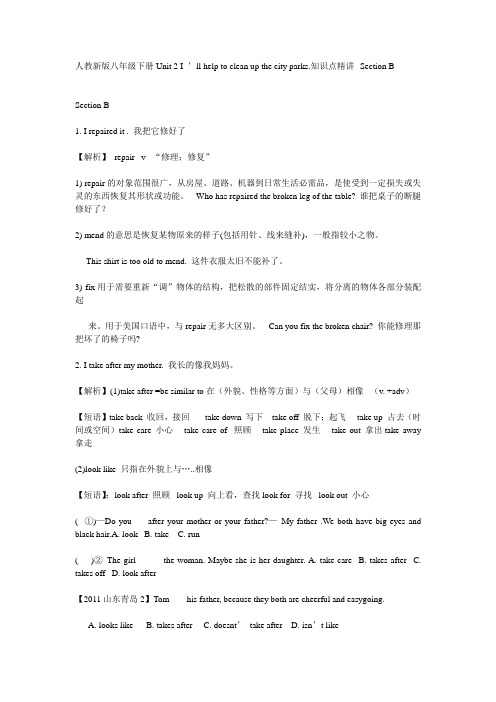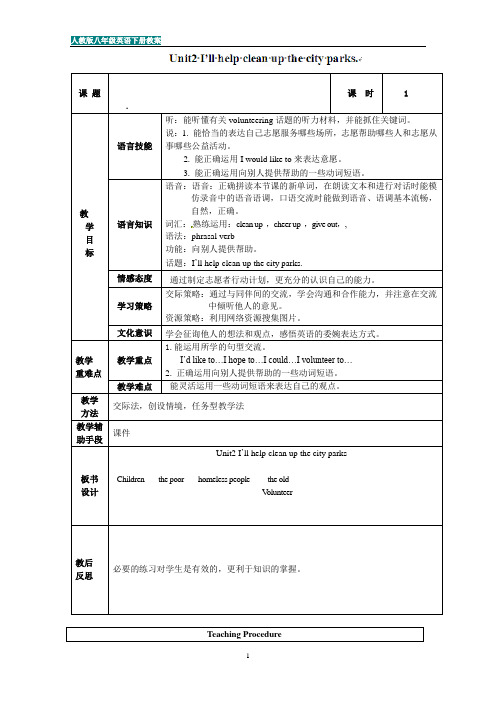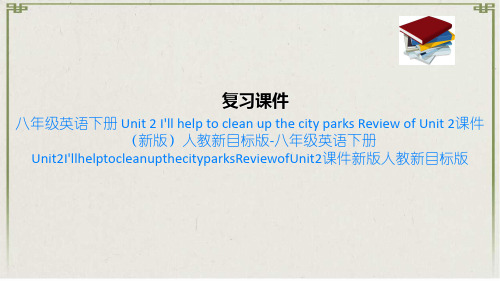2I'll help to clean up the city parks教材
人教新版八年级下册Unit2I’llhelptocleanupthecityparks.知识点精讲--SectionB

人教新版八年级下册Unit 2 I ’ll help to clean up the city parks.知识点精讲--Section B Section B1. I repaired it . 我把它修好了【解析】repair v “修理;修复”1) repair的对象范围很广,从房屋、道路、机器到日常生活必需品,是使受到一定损失或失灵的东西恢复其形状或功能。
Who has repaired the broken leg of the table? 谁把桌子的断腿修好了?2) mend的意思是恢复某物原来的样子(包括用针、线来缝补),一般指较小之物。
This shirt is too old to mend. 这件衣服太旧不能补了。
3) fix用于需要重新“调”物体的结构,把松散的部件固定结实,将分离的物体各部分装配起来。
用于美国口语中,与repair无多大区别。
Can you fix the broken chair? 你能修理那把坏了的椅子吗?2. I take after my mother. 我长的像我妈妈。
【解析】(1)take after =be similar to在(外貌、性格等方面)与(父母)相像(v. +adv)【短语】take back 收回,接回take down 写下take off 脱下;起飞take up 占去(时间或空间)take care 小心take care of 照顾 take place 发生take out 拿出take away 拿走(2)look like 只指在外貌上与…..相像【短语】:look after 照顾look up 向上看,查找look for 寻找look out 小心( ①)—Do you ___after your mother or your father?—My father .We both have big eyes and black hair.A. look B. take C. run( )②The girl _____ the woman. Maybe she is her daughter. A. take care B. takes after C. takes off D. look after【2011山东青岛2】Tom ___ his father, because they both are cheerful and easygoing.A. looks likeB. takes afterC. doesnt’take afterD. isn’t like3. I fixed it up. 我把它修理好了。
人教版英语初二下册 Unit 2 I`ll help to clean up the city park 知识讲解

Unit 2 I’ll help to clean up the city parks.词句精讲精练词汇精讲1. clean upclean up意为“打扫”,up为副词,此短语是动副型短语,如果宾语为代词,应放在短语中间;如果宾语是名词,可放于短语之间或两词之后。
例如:Please clean up this street at once. 请马上把这条街打扫干净。
This street is dirty. Please clean it up. 这条街道太脏了,请把它打扫干净。
2. cheer upcheer up意为“变得高兴,振奋起来”,是“动词+副词”结构的短语。
cheer up既可作及物动词短语,也可作不及物动词短语。
例如:He cheered up at once when I agreed to help him. 我同意帮助他时,他马上高兴起来。
Cheer up! The news isn’t too bad. 振作起来!这消息不是太坏。
He took her to the cinema to cheer her up. 为了让她高兴,他带她去了电影院。
【拓展】(1) cheer作不及物动词,意为“欢呼;喝彩”。
例如:The girls cheered as the famous singer arrived. 当这位著名的歌手到达时,女孩子们大声欢呼。
(2) cheer作及物动词,意为“为……欢呼,高呼”。
例如:The whole village turned out to cheer the hero. 全村人都出来向那位英雄欢呼。
(3) cheer作可数名词,意为“欢呼声;喝彩声”。
例如:We can hear the cheers of students outside the gym. 我们在体育场外就能听到学生的欢呼声。
(4) cheer on意为“为……加油”。
例如:We will have a basketball game this afternoon. Would you like to come and cheer us on?我们今天下午有一场篮球比赛,你愿意来为我们加油吗?3. give outgive out意为“散发;分发”,相当于hand out,是“动词+ 副词”结构的短语动词。
八年级英语下册教案:Unit 2 I’ll help to clean up the city

课题.课时 1教学目标语言技能听:能听懂有关volunteering话题的听力材料,并能抓住关键词。
说:1. 能恰当的表达自己志愿服务哪些场所,志愿帮助哪些人和志愿从事哪些公益活动。
2. 能正确运用I would like to来表达意愿。
3. 能正确运用向别人提供帮助的一些动词短语。
语言知识语音:语音:正确拼读本节课的新单词,在朗读文本和进行对话时能模仿录音中的语音语调,口语交流时能做到语音、语调基本流畅,自然,正确。
词汇:熟练运用:clean up ,cheer up ,give out,,语法:phrasal verb功能:向别人提供帮助。
话题:I’ll help clean up the city parks.情感态度通过制定志愿者行动计划,更充分的认识自己的能力。
学习策略交际策略:通过与同伴间的交流,学会沟通和合作能力,并注意在交流中倾听他人的意见。
资源策略:利用网络资源搜集图片。
文化意识学会征询他人的想法和观点,感悟英语的委婉表达方式。
教学重难点教学重点1.能运用所学的句型交流。
I’d like to…I hope to…I could…I volunteer to…2. 正确运用向别人提供帮助的一些动词短语。
教学难点能灵活运用一些动词短语来表达自己的观点。
教学方法交际法,创设情境,任务型教学法教学辅助手段课件板书设计Unit2 I’ll help clean up the city parksChildren the poor homeless people the oldV olunteer教后反思必要的练习对学生是有效的,更利于知识的掌握。
Teaching ProcedureStages/TimingTeachet ers’ activities Students’ activities MethodologyStep 1 Warming upStep 2 lead-inStep 3 practice T: Could you please help me close thedoor?Could you please help me open thewindow?Thanks for your help.Do you know there is a special day inDecember. On that day, many peoplewo uld like to help others who need help.Do you know when is it and what day is itthat day?Introduction of “International V olunteerDay”Time: December 5th.They give people help without hope ofrewardLet’s enjoy some pictures.Show some pictures.They help to sent food to the poor people.They help to examine the health conditionof the old.They help to cut the hair of the poor.They help to clean the yards of thecommunity.They help to clean the bus-stop.What else could we do to help people?Show some other pictures.I’d like to/I hope to/I could/I volunteerto:help children with their schoolwork.visit the old in an old people’s home.help watch the traffic.give our old boo ks to “Hope School”.cheer up sick kids in the hospital.…1a. Look at the ways y ou could helppeople in thepicture. Then list other ways.Other ways you could help people___________________________________________________________________________________________________Ss do it.Ss think about it.Ss: They help to sentfood to the poorpeople.They help toexamine the healthcondition of the old.They help to cut thehair of the poor.They help to cleanthe yards of thecommunity.They help to cleanthe bus-stop.What else could wedo to help people?Ss: I’d like to/Ihope to/I could/Ivol unteer to:Ss do 1a.复习,进一步巩固落实。
人教新目标版八年级下册Unit2 I'll help to clean up the city parks单元知识点

Unit 2 I’ll help to clean up the city parks.课时 1 Section A(1a-2d)学习目标:一、掌握动词短语clean up, cheer up 的用法。
(重点)二、能用could, can’t, will等情态动词给出建议。
课堂导学:1.You could help to clean up the city parks.Clean up 为动副短语,意为“打扫干净”。
若后接代词作宾语,代词应放在clean和up中间;若后接名词作宾语,名词可放在两次之间或up之后。
She cleaned up the broken glass on the floor.即学即练一根据汉语意思完成句子我的房间很脏,所以我必须把它打扫干净。
My room is very dirty, so I have to .2.The girl could visit the sick kids in the hospital to cheer them up.短语2:cheer up使高兴;使振奋。
后接代词作宾语时,代词应放在cheer up中间.She failed the exam, and we want to cheer her up.即学即练二单项选择The child looked sad. Let’s .(选出与划线部分意思相同或相近的选项)A. happyB. make him happyC. shoutD. give help3.The boy could give out food at the food bank.短语3:give out 分发;散发;发放give out 是动副短语,意为“分发;散发;发放”,后接名词作宾语时,名词可放在短语后面,也可放在短语中间;后接代词作宾语时,代词只能放在短语中间。
其同义短语为“hand out”。
I saw a man giving out leaflets in the street.Give them out before class begins.即学即练三单项选择-Would you like to help me to the papers to the students, Tom?-Certainly, Miss Wang.A.give upB. give offC. give outD. give in4. We could put up signs.短语4:put up张贴;搭建Put up在该句中意为“张贴(布告)等”,此外它还可表示“公布;搭建;举起(手)等”。
八年级英语下册 2 I'll help to clean up the city par

3. As a volunteer, the girl wants to visit sick kids in
the hospital _______ them up.
A. to cheer
B. cheer
C. cheering
D. cheered
短语动词
短语动词是由动词加介词、副词或 其他词构成的固定词组或习语,其作用 和动词相近。
9. I’m __e_x_c_it_e_d_ (excite) about your change. I’m happy you are a good student now.
三、单项选择。
1. The teenagers often help ______ water and
food to those people in need.
5. I’m able to have a “dog helper” because of your _k_i_n_d_n_e_s_s (kind).
6. Do you have any __d_i_ff_i_c_u_lt_ie_s__ (difficult) in learning English?
viewofUnit2课件新版人教新目标版
看看远处,要保护好眼睛哦~站起来
动一动,久坐对身体不好哦~
3. It took me _se_v_e_r_a_l (一些) days to finish the work. 4. To our __j_o_y__ (高兴), we arrived home before it
7. After six months of __tr_a_i_n_in_g__ (train), he is now good at playing basketball.
Unit 2 单元知识点复习 2022-2023学年人教版英语八年级下册

人教版英语八年级下册第二单元知识点过关Unit 2 I ’ll help to clean up the city parks.一、重点短语1. Clean-Up Day 清洁日、大扫除2. an old people’s home 一家养老院3. help out with sth. 帮助解决困难;例如:What did they ask you to help out with他们叫你帮忙做什么?ed to 曾经…、过去;例如:I used to be a shy girl . 我过去是个害羞的女孩儿。
5.care for 关心、照顾;例如:Every year , the volunteers spend two months caring for the old in the old people’s home. 每年,志愿者们花两个月时间去养老院照顾老人。
6. the look of joy 快乐的表情;例如:The teacher was happy to see the look of joyon her students’ faces. 老师很高兴看到学生们脸上快乐的表情。
7. at the age of 在......岁时;例如:The little boy could dress himself at the age of three. 这个小男孩在三岁的时候就可以自己穿衣服了。
8.clean up 打扫(或清除)干净9. cheer up (使)变得更高兴;例如:Don’t be sad , cheer up , life is full of sunshine.不要悲伤了,高兴起来吧,生活充满了阳光。
10. give out 分发、散发,同义词hand out11. come up with 想出、提出;例如:The clever boy can always comes up some good ideas. 这个聪敏的男孩儿总能想出一些好主意。
人教版英语八年级下册Unit2《I’llhelptocleanupthecitypark》说课稿
人教版英语八年级下册Unit 2《I’ll help to clean up the city park》说课稿一. 教材分析人教版英语八年级下册Unit 2的主题是“I’ll help to clean up the city park”,通过本节课的学习,学生将掌握一般将来时的用法,学会如何表达将来的计划和承诺。
教材内容丰富,包括听力、口语、阅读和写作等方面,旨在培养学生的综合语言运用能力。
此外,本节课还涉及了环保意识的教育,引导学生关注环境保护,培养他们的社会责任感和公民意识。
二. 学情分析八年级的学生已经具备了一定的英语基础,能够听懂并运用一般现在时、一般过去时和一般将来时。
但在实际运用中,部分学生对时态的掌握还不够熟练,容易混淆。
此外,学生的词汇量和语法知识有限,对于一些复杂句型的理解和运用还需加强。
因此,在教学过程中,教师需要关注学生的个体差异,针对不同层次的学生进行有针对性的指导。
三. 说教学目标1.知识目标:学生能够掌握一般将来时的用法,学会如何表达将来的计划和承诺。
2.能力目标:学生能够听懂、会说、会读、会写关于将来的计划和承诺的句子。
3.情感目标:学生能够关注环境保护,培养他们的社会责任感和公民意识。
四. 说教学重难点1.教学重点:一般将来时的用法,如何表达将来的计划和承诺。
2.教学难点:一般将来时的句子结构,以及如何正确运用相关词汇和语法知识。
五. 说教学方法与手段1.教学方法:采用任务型教学法、情境教学法和交际法,引导学生参与课堂活动,提高他们的语言运用能力。
2.教学手段:利用多媒体课件、图片、卡片等辅助教学,创设真实情境,激发学生的学习兴趣。
六. 说教学过程1.导入:通过展示城市公园的图片,引导学生谈论自己对公园的印象和感受,引出本节课的主题。
2.新课呈现:讲解一般将来时的用法,展示相关句子和例句,让学生感知和理解一般将来时的结构。
3.操练环节:通过听力练习、角色扮演、小组讨论等形式,让学生在实际语境中运用一般将来时。
人教版unit2 I'll help to clean up the city parks知识点
23.blind adj失明的,盲人
v使变瞎blinds--blinding--blinded
n窗帘复数blinds借口,托词
the+形容词:代表一类特征或性质相同的人,谓语用复数。
the deaf聋人the blind盲人the dead死者the rich富人the poor穷人
41.ask sb to do要求某人做某事
语法:
1.need的用法:
(1)实义动词:需要
need sth需要某物
need to do sth有责任或义务去做某事
need doing = need to be done(动名词有被动的意思,可以改成不定式的被动形式)The door need painting= The door need to be painted。
ed to be过去曾经.是....,How things used to be
used to do过去常常做......
26.care for sb/sth照顾,非常喜欢=take care of = look after
在否定句疑问句中,意为“喜欢,想要某物”
She doesn’t care for the color.
other students其他的学生
other information其他的信息
the other:两者中的另一个。常用于one......the other......“一个...另一个...”句型中。
others:单独使用。表示“两个和两个以上的其他的人或事物”。
常用于“some.....others....一些.....另外一些......”的句型中。
Unit 2 I`ll help to clean up the city park 知识讲解
Unit 2 I’ll help to clean up the city parks.词句精讲精练词汇精讲1. clean upclean up意为“打扫”,up为副词,此短语是动副型短语,如果宾语为代词,应放在短语中间;如果宾语是名词,可放于短语之间或两词之后。
例如:Please clean up this street at once. 请马上把这条街打扫干净。
This street is dirty. Please clean it up. 这条街道太脏了,请把它打扫干净。
2. cheer upcheer up意为“变得高兴,振奋起来”,是“动词+副词”结构的短语。
cheer up既可作及物动词短语,也可作不及物动词短语。
例如:He cheered up at once when I agreed to help him. 我同意帮助他时,他马上高兴起来。
Cheer up! The news isn’t too bad. 振作起来!这消息不是太坏。
He took her to the cinema to cheer her up. 为了让她高兴,他带她去了电影院。
【拓展】(1) cheer作不及物动词,意为“欢呼;喝彩”。
例如:The girls cheered as the famous singer arrived. 当这位著名的歌手到达时,女孩子们大声欢呼。
(2) cheer作及物动词,意为“为……欢呼,高呼”。
例如:The whole village turned out to cheer the hero. 全村人都出来向那位英雄欢呼。
(3) cheer作可数名词,意为“欢呼声;喝彩声”。
例如:We can hear the cheers of students outside the gym. 我们在体育场外就能听到学生的欢呼声。
(4) cheer on意为“为……加油”。
例如:We will have a basketball game this afternoon. Would you like to come and cheer us on?我们今天下午有一场篮球比赛,你愿意来为我们加油吗?3. give outgive out意为“散发;分发”,相当于hand out,是“动词+ 副词”结构的短语动词。
八年级英语下册 Unit 2 I'll help to clean up the city park
⑥Volunteering here is a dream come true for me. ⑦Lucky makes a big difference to my life. ⑧You helped to make it possible for me to have Lucky. ⑨So I fix up the bikes and then give them away to these kids. ⑩I love animals and I was excited about the idea of having a dog.
第5页
I would like to ________ for charity The International Day of Charity is coming.Many people will do something for it.What should I do? Here are my ideas. I would like to…
第3页
经典范文展示 为迎接国际慈善日(the International Day of Charity)到来,某英文报刊 将要举行有奖征文活动,请你以“I would like to ________for charity”为 题写一篇短文,为此次活动投稿。步骤与关键点以下: 1.确定主题,并在文中说明原因;2.围绕主题,进行叙述;3.写出 详细计划, 也能够讲述一段与主题相关故事或经历。
惯用句型: ①You could help to clean up the city parks. ②The girl could visit the sick kids in the hospital to cheer them up. ③We need to come up with a plan to tell people about the city park cleanup. ④We can't put off making a plan. ⑤I want to learn more about how to care for animals.
- 1、下载文档前请自行甄别文档内容的完整性,平台不提供额外的编辑、内容补充、找答案等附加服务。
- 2、"仅部分预览"的文档,不可在线预览部分如存在完整性等问题,可反馈申请退款(可完整预览的文档不适用该条件!)。
- 3、如文档侵犯您的权益,请联系客服反馈,我们会尽快为您处理(人工客服工作时间:9:00-18:30)。
Unit 2 I'll help to clean up the city parksSection ALanguage Goal :Offer helpLook at the ways you could help people in the picture. Then list other ways .Other ways you could help peopleListen and number the ways the boy and girl could help others .The girl could visit the sick kids in the hospital and cheer them up . The boy could give food at the food bank .The girl could volunteer in and after school program to teach kids .The boy could help to clean up the city parks .Practice the conversation in the picture above . Then make other conversations using the information in 1b.A group of students are planning a City Park Clean-up Day. Listen and check (√ )thethings they are going to do to tell people about it .Listen again. Fill in the blanks.1. We need to a plan to tell people about the citypark clean-up .2. Clean-up Day is only two weeks from now . We can' tmaking a plan .3. We could signs .4. Let' s make some notices ,too. Then I ' llthem after school .5. We could each 10 students and ask them to come.Make a conversation using the information in 2a and 2b .Role-play the conversation.Helen :Hi , Tom . I ' m making some plans to work in an old people’s home this summer.Tom : Really? I did that last summer.Helen :Oh, what did they ask you to help out with ?Tom :Mmm.… things like reading the newspaper to the old people, or just talking to them. They told me stories about the past and how things used to be.Helen :That sounds interesting .Tom :Yeah , a lot of old people are lonely . We should listen to them and care for them.Helen :You ' re right . I mean, we’re all going to be old one day, too.Read the article . What do Mario and Mary volunteer to do?Students Who VolunteerMario Green and Mary Brown from Riverside High School give up several hours each week to help others.Mario loves animals and wants to be an animal doctor. He volunteers atan animal hospital every Saturday morning. Mario believes it can help him toget his future dream job. “ It ' s hard work , ” he says , “but I want to learnmore about how to care for animals . I get such a strong feeling of satisfactionwhen I see the animals get better and the look of joy on their owners' faces.”Mary is a book lover. She could read by herself at the age of four. Last year she decided to tryout for a volunteer after-school reading program .she still works there once a week to help kidslearn to read. The kids are sitting in the library, but you can see intheir eyes that they ’re going on a different journey with each newbook. V olunteering here is a dream come true for me. I can do whatI love to do and help others at the same time.Read the article again and answer the questions . 1. Why do Mario and Mary volunteer to help others ?2. What do they say about volunteering ?Use infinitives to complete the sentences below.1. Mario would like an animal doctor .2. He works for an animal hospital because he wants about how for animals .3. Mary decided out for a job at an after-school reading program last year . She still works there now kids learn to read .4 . Mary has a dream job because she can do what she loves .Fill in the blanks with the phrasal verbs in the box.1. I want to my plan to work in an animal hospital until next summer. I’m too busy with my studies this year.2. She hopes to at least five primary schools to ask if they need volunteers for their after-school programs.3. Our class is trying to some ideas to sick children because they are often sad.4. We decided to signs around the school and notices to tell students about the book sale. We will the money from the saleto homeless people.Fill in the blanks with the correct forms of the verbs in the box .Most people today are only worried about getting good jobs lots of money. In their free time, They think about what for fun or relaxation. However, few people think about what they can do others. There are many people who are less lucky than us. V olunteering our time to help these people is a good way our free time. For example, we can make plans sick children in the hospital or raise money for homeless people. Some people even stop doing their jobs for a few months to a year to another country, like Africa, and help people there.Complete the sentences with your own ideas. Use infinitives.1.I’d like to volunteer _____________________________.2.At 12:00 a.m., I called my friend _____________________________.3.I’m very busy but I could help _____________________________.4.Summer vacation is coming, I want _____________________________.5.I want to travel alone. My parents told me(not) _____________________________.Section BMatch the sentences with similar meanings.b 1.I’ve run out of it. a. I repaired it.2.I take after my mother. b. I d on’t have any more of it.3.I fixed it up. c. I’m similar to her.4.I gave it away. d. I didn’t keep it.Match the phrasal verbs with the nouns. Then make sentences with the phrases.I gave away my bike to a children’s home. ___________________________________________ _____________________________________________________________________________________________________________________________________________Listen and number the pictures [1-4] in the correct order.Listen again. Circle T for true or F for false.1.Jimmy fixes up broken bicycle parts, like wheels. T F2.Jimmy sells bikes. T F3.Jimmy takes after his mother. T F4.Jimmy has run out of money. T FRole-play a conversation between Jimmyand the reporter. Use the information in1c and 1d.How do you usually thank someone who helps you? Discuss this with a partner.Skim the letter and answer the questions.1. Who wrote the letter to Miss Li? Why?2. What did Miss Li do?I’ll Send You a Photo of LuckyDear Miss Li,I’d like to thank you for sending money to Animal Hel pers. I’m sure you know that this group was set up to help disabled people like me. You helped to make it possible for me to have Lucky. Lucky makes a big difference to my life. Let me tell you my story.What would it be like to be blind or deaf? Or imagi ne you can’t walk ou use your hands easily. Most people would never think about this, but many people have these difficulties. I can’t use my arms or legs well, so normal things like answering the telephone, opening and closing doors, or carrying things are difficult for me. Then one day last year, a friend of mine helped me out. She talked to Animal Helpers about getting me a special trained dog. She also thought a dog might cheer me up. I love animals and I was excited about the idea of having a dog.After six months of training with a dog at Animal Helpers, I was able to bring him home. My dog’s name is Lucky — a good name for him because I feel very lucky to have him. You see, I’m only able to have a “dog -helper” because of your kindness! Lucky is very clever and understands many English words. He can understand me when I give him orders. For example, I say, “Lucky! Get my book,” and he does it at once.Lucky is a fantastic dog. I’ll send you a photo of him if you like,and I could show you how he helps me. Thank you again forchanging my life.Best wishes,Ben SmithLook at the list of words below. Circle the part of speech of each word and make your own sentences with these words.1.group(adj./n.) ___________________________________________________2.disabled (adj./adv.)______________________________________________3.difference (adv./n.) ______________________________________________4.imagine(v./n.)_________________________________________________5.difficulties(n./adj.) ________________________________________________6.normal (adv./adj.)_________________________________________________7.training(adv./n.)___________________________________________________8.kindness ( n./v.) __________________________________________________Use information in the letter to make true sentences by matching the different parts. SUBJECT VERB OBJECTMiss li can get unable to move well.Ben Smith trains money to Animal Helpers.Lucky sent animals like Lucky.Animal Helpers is things for disabled people.Discuss the questions with a partner.Look at these kinds of volunteer work. Can you add more? What would you like to do?Discuss it with a partner.Working in an old people’s homeHelping kids in an after-school programBeing a guide at a museumWrite a letter or e-mail to the place you want to volunteer at.1 Fill in each blank with a possible verb to make a phrasal verb.e.g. cheer up1. up 3. away 5. after2. off 4. out of 6. up with2 Fill in the blanks with the appropriate phrasal verbs or infinitives.Last week, everyone was trying up Jimmy, the Bike boy. He was unhappy because he of money old bikes. He some signs asking for old bikes and all his friends on the phone them about the problem. He even notices at the supermarket. Then he told the teachers at school about his problem and they a call-in center for parents. The ideas that he with worked out fine. He now has 16 bikes upand to children who don’t have bikes.。
